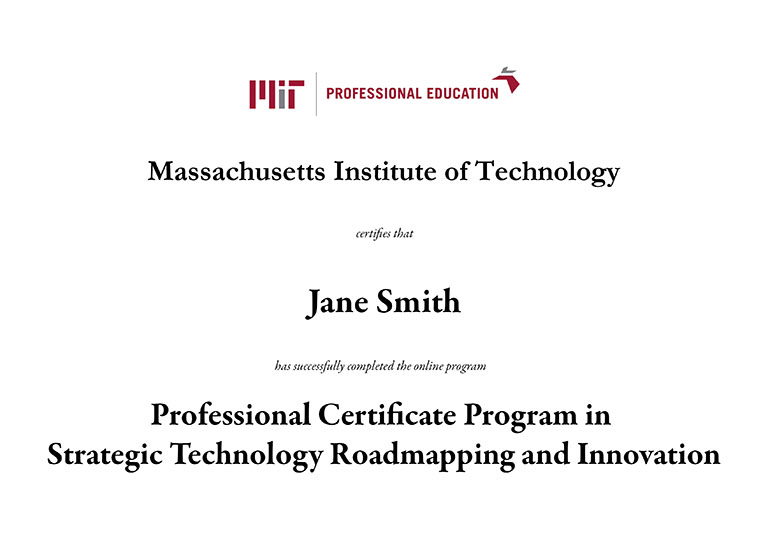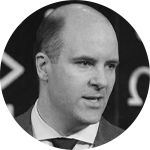PROFESSIONAL CERTIFICATE PROGRAM IN
Strategic Technology Roadmapping and Innovation
The current complexities of technology implementation
Effective technology implementation requires careful planning, evaluation, and management to ensure that you incorporate the disruptive technologies that will benefit your organization the most, keeping in mind your workforce, product or service, and goals. By applying data analysis and theory, elaborating technology roadmaps, and examining reskilling and upskilling solutions, business leaders can enhance the decision-making process for new investments and ensure that every aspect of a business is optimized in the process of implementing new tech.
As these new, disruptive technologies trigger the seismic shifts currently affecting multiple industries around the globe, organizations are constantly looking to incorporate the latest developments and maximize efficiency. And as technology evolves at a faster-than-ever pace, these momentous changes reiterate the need for decision-makers to carefully place their strategic bets, lead their teams effectively, and leverage all available data to achieve their goals.
An online Professional Certificate Program to evaluate, incorporate, and manage new technology
This Professional Certificate Program in Strategic Technology Roadmapping and Innovation is a technical program with an emphasis on:
strategic technological leadership
team management
data-driven planning
decision-making
This all-encompassing program incorporates a wide range of expertise and skills to strategically boost innovation in your organization, including technology forecasting and roadmapping, innovation management, and the use of data analysis to enhance the decision-making process behind tech investment and design. You will discover how these disciplines converge to guide you toward developing more efficient business operations.
The Learning Journey
In this nine-month online program, participants will explore these four courses in-depth to discover how to prepare their organizations for their own technological transformation:
Management of Technology:
Roadmapping & Development
Management of Technology:
Strategy & Portfolio Analysis
Digital Platforms: Designing Two-Sided Markets from APIs to Feature Roadmaps
Forecasting Technology Innovation: Using Data for Strategic Advantage
The skills you will develop
By more effectively uniting the disciplines of innovation, technology, and workforce management under a single directive, professionals will be able to lead their teams and organizations to successfully select, deploy, and manage technology. In this Professional Certificate Program, you will be able to:
1.
Quantify technological progress over time
using relevant figures of merit (FOMs), map one or more technologies to a target product and/or service of their choice, and set realistic FOM-based targets.
2.
Shape the R&D strategy and portfolio
of an organization based on a set of technology roadmaps along with the creation of an environment conducive to R&D project execution.
3.
Leverage both the theory and data analysis-based insights
into technological, innovation-related outcomes to improve investment and design choices.
4.
Establish a clear vision of their strengths and goals
as a leader while contemplating the full range of impacts that leadership can have on innovation.
5.
Discover how to create, communicate, and solve problems
in an innovative way that fosters an environment of creativity and innovation.
In addition, you will receive a Certificate of Completion
All the participants who successfully complete Strategic Technology Roadmapping and Innovation will recieve a Certificate of Completion from MIT Professional Education. Furthermore, the participants who complete the program recieve Continuing Education Units (CEUs)*.
To obtain CEUs, complete the accreditation confirmation, which is available at the end of the course. CEUs are calculated for each course based on the number of learning hours.
* The Continuing Education Unit (CEU) is defined as 10 contact hours of ongoing learning to indicate the amount of time they have devoted to a non-credit/non-degree professional development program.
To understand whether or not these CEUs may be applied toward professional certification, licensing requirements, or other required training or continuing education hours, please consult your training department or licensing authority directly.

This Professional Certificate Program is designed for (but not limited to)
- C-SUITE—INCLUDING CTOs AND CINOs—AND LEADERS OF TECHNOLOGICAL DEPARTMENTS OR PROJECTS
who need to understand the evolution of technology and optimal technology management for their organizations.
- TECHNICAL PROFESSIONALS
wishing to discover how the methods and tools of technology management can transform their business operations.
- CEOs, ENTREPRENEURS, AND FUNCTIONAL MANAGERS
looking to create new business models and/or scale up their current operations.
- R&D PROJECT EXECUTIVES AND PROJECT MANAGERS
seeking to understand the benefits and opportunities that technology offers their organization and its digital transformation.
PREREQUISITES
Experience is beneficial but not required.
Meet the instructors of this program
Listed in alphabetical order

Dr. Cameron teaches the subject of System Architecture for the “System Design and Management”, where he has trained over 500 students. Dr. Cameron´s teaching at Sloan Executive Education has been rated as the highest level of Executive Education program at MIT for several years. In addition, he is the Faculty Director of MIT´s online certificate “Architecture and System Engineering”, which has trained more than 5,300 participants.

Her models have also been used to inform government innovation policy and applied in diverse industries, including finance, healthcare, manufacturing, software, and consumer products. Trancik’s work has been published in journals such as Nature, Proceedings of the National Academy of Sciences, Nature Energy, Nature Climate Change, and Environmental Science and Technology, and has been featured by news outlets such as The New York Times, The Washington Post, Financial Times, and NPR.
Professor Trancik received her Bachelor of Science from Cornell University and her PhD from the University of Oxford as a Rhodes Scholar.
Trancik develops data-informed models to evaluate the economic and environmental impacts of energy technologies over time and space.
Trancik’s models for forecasting technological change have informed engineering design, public policy, and investment portfolios.

Professor De Weck is a leader in systems engineering research. He focuses on the design of complex man-made systems, such as aircraft, spacecraft, cars, printers and critical infrastructure, and on their evolution. His main focus is on strategic properties that have the potential to maximize life cycle value. Since 2001, his group has developed new methods and quantitative tools that explicitly consider production, flexibility, common features and sustainability, among other characteristics. Professor De Weck’s teaching emphasizes excellence, innovation, and the combination of theory and practice.
PROGRAMS: Designing Product Families
Application Process
Complete the application form and pay the non-refundable fee.
Receive a call for an interview with our admissions team
Our Admission Committee will inform the final decision*. *(2 business days max)